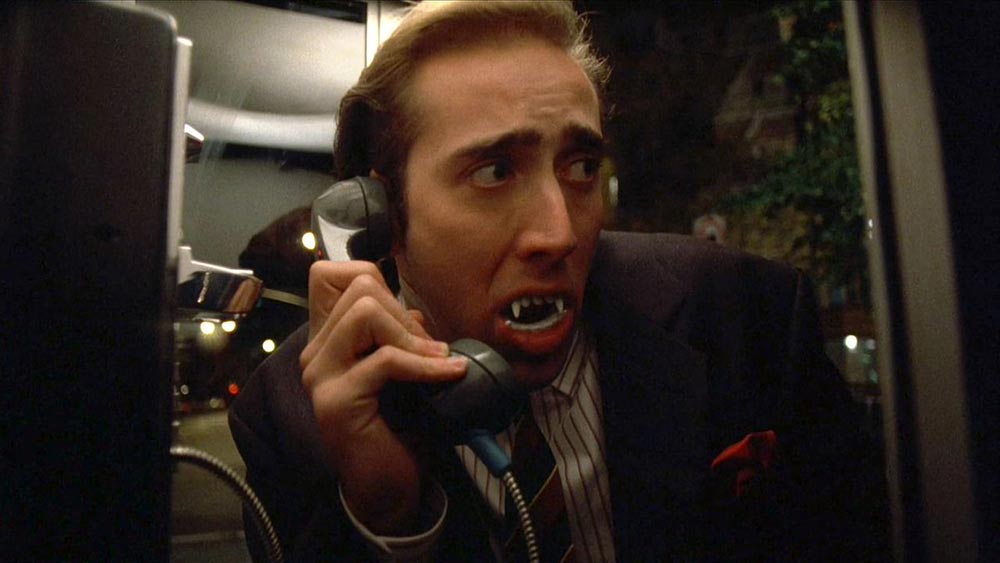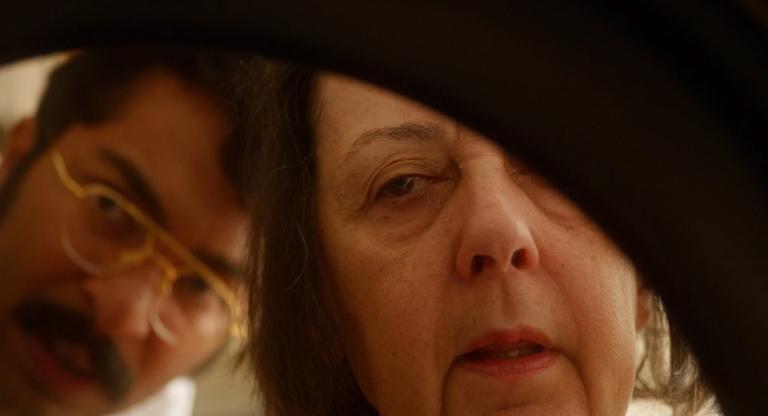Sliding in just between Nicolas Cage’s first steps toward insanity in Moonstruck (1987) and his caricature-with-my-eyes-closed turn in Wild at Heart (1990), Vampire’s Kiss (1988) is unmissable for fans of “the process.” It is a crucial moment in the development of Cage’s personal brand of acting method—which he has dubbed “nouveau shamanic”—and a key representative of the early years of his filmography. By 2009, the whole thing had kicked into overdrive; for Werner Herzog’s Bad Lieutenant: Port of Call New Orleans, Cage became Cage and Cage only. From that point on he was never really playing a role as much as roles were playing him. Cage became a self-symbol, his very name implanting certain preconceived notions in the viewer’s mind before the film has begun.
In Vampire’s Kiss, even before the title slate, the name NICOLAS CAGE hovers ominously over Lower Manhattan at sunrise. It is a premonition that seems to warn not only of Cage as a specter haunting the city, but perhaps also of his future meme-ability as a cultural phenomenon.
Peter Loew (Cage) works in the foreign distribution arm of a publishing company, a portrait of Kafka awkwardly placed on the windowsill for good measure. He sits in a position of obvious power, which he abuses by constantly pestering his secretary Alva (María Conchita Alonso) about a missing file in the Der Spiegel account. Despite appearances, our introduction to Loew puts him in his proper place: we first see him as a lost yuppie, fully horizontal on his therapist’s couch. “I wanted her to get the hell out of there,” he recounts. Dr. Glazer (Elizabeth Ashley) points out the paradox: “And yet just the night before, you wanted her very badly.”
In the midst of Loew’s womanizing, he is bitten by a vampire (or is he?), and from there the film pingpongs between nights at the club, days at the office, and afternoons at Dr. Glazer’s. Eventually Loew really goes off the rails, and temporal realities switch: nights at the office, early mornings at the club, days sleeping under a makeshift coffin (an upturned couch) in his living room.
Vampire’s Kiss is a minor sleaze fest, almost Roger Corman–esque, in which gratuitous nudity finds a place next to a laughably bad prop bat. Indeed, screenwriter Joseph Minion holds a certain tie to Corman—he made his directorial debut with Daddy’s Boys (1987), which Corman produced. If you doubt the film’s unsavory credentials, there’s even mention of a club called Mondo Cane. Ultimately Vampire’s Kiss is unsure of itself, lost, and wandering, and so embodies its protagonist’s struggles. Yet nowhere else in cinema history will you hear such an inspired performance of the entirety of the alphabet.
Vampire's Kiss screens Wednesday and Sunday at the 4 Star.
Previousluy:
Vampire's Kiss screens Friday, June 21, at the Drafthouse New Mission.
Vampire’s Kiss screens this morning and tomorrow, February 26 and 27, at Nitehawk Williamsburg in 35mm as part of the series “Love Sucks.”



